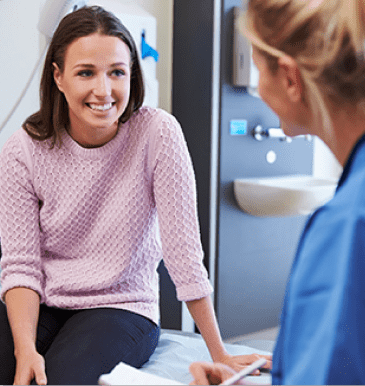Medical Requirements for Egg Donors
The basic medical requirements for egg donors are that you must be a woman between 21-32 years of age in general good health. You should be height and weight proportionate with a BMI no less than 18.5 and no more than 30.

Other Medical Requirements for Egg Donors
You must complete, if selected, appropriate testing and have a recent normal pap test. After testing is completed you will begin taking several medications to prepare your body for egg retrieval. These Medical Requirements for Egg Donors are described below:
This medication is a gonadotropin-releasing (GnRH) agonist. It is given as a daily injection in the AM. It is given with a very small needle. You will be instructed in how to administer this medication to yourself. It must be taken everyday and is used to suppress your natural cycle and to prevent premature release of your eggs and must be taken as directed by your physician. It is a very small dose and side effects should be at a minimum, but will be discussed with you during your initial consultation. You will get a period while on Lupron. This is natural and expected. It should be noted that most IVF clinics have been moving more towards the GnRH antagonist cycle (no lupron) so most likely this will not be utilized for your cycle.
This medication is given subcutaneously with a very small needle and usually once per day. It is usually administered in the evening. In a normal cycle women will usually ovulate only one egg. In order to increase the chances of pregnancy our goal is to stimulate the ovaries to produce multiple eggs so that more than one embryo will be available for the transfer to the uterus of the recipient or their Gestational carrier. This stimulation is accomplished with the use of these medications. There is monitoring necessary on the 4th day of this medication and then every other day or every day after. It is necessary to make sure that this medication is given in careful doses to control the ovarian hyperstimulation that you may experience. If you cannot comply with this monitoring then you will not be able to participate in the donation program.
This is a final injection and will be given 34-36 hours prior to your egg donation. The timing of this injection is based on your estradiol level and other considerations. It is the final step in maturing the eggs. This is an IM (Intramuscular) injection and you must have someone available to give you this injection. It is a critically timed medication. We can give these instructions to a family member or friend and this will be arranged at your injection class at the local clinic. Because HCG is the final step in this process as far as medication is concerned you should know that missing this injection or not be at the clinic at the appropriate time for your procedure may ruin the entire process.
- Complete again on day 2 or 3 of your cycle baseline blood work for hormonal bloods
- Be prescribed birth control pills will to help synchronize your body’s cycle with that of your recipient
- Receive daily injections of Lupron for a period of about two weeks (if applicable).
- Take stimulation medication for approximately 10 days (in addition to continuing the Lupron, if you are taking Lupron)
- If you are not using Lupron then you will take injections of Ganirelix to prevent your own ovulation. This begins on medication day 4 or after at your IVF clinic’s direction.
- Receive one final medication of HCG / Ovidrel / Lupron trigger
- Undergo egg retrieval 34-36 hours after receiving your HCG injection
- Depending on your medical facility you may continue taking birth control pills during the start of the Lupron (if applicable), although the physician may change the type of pill.